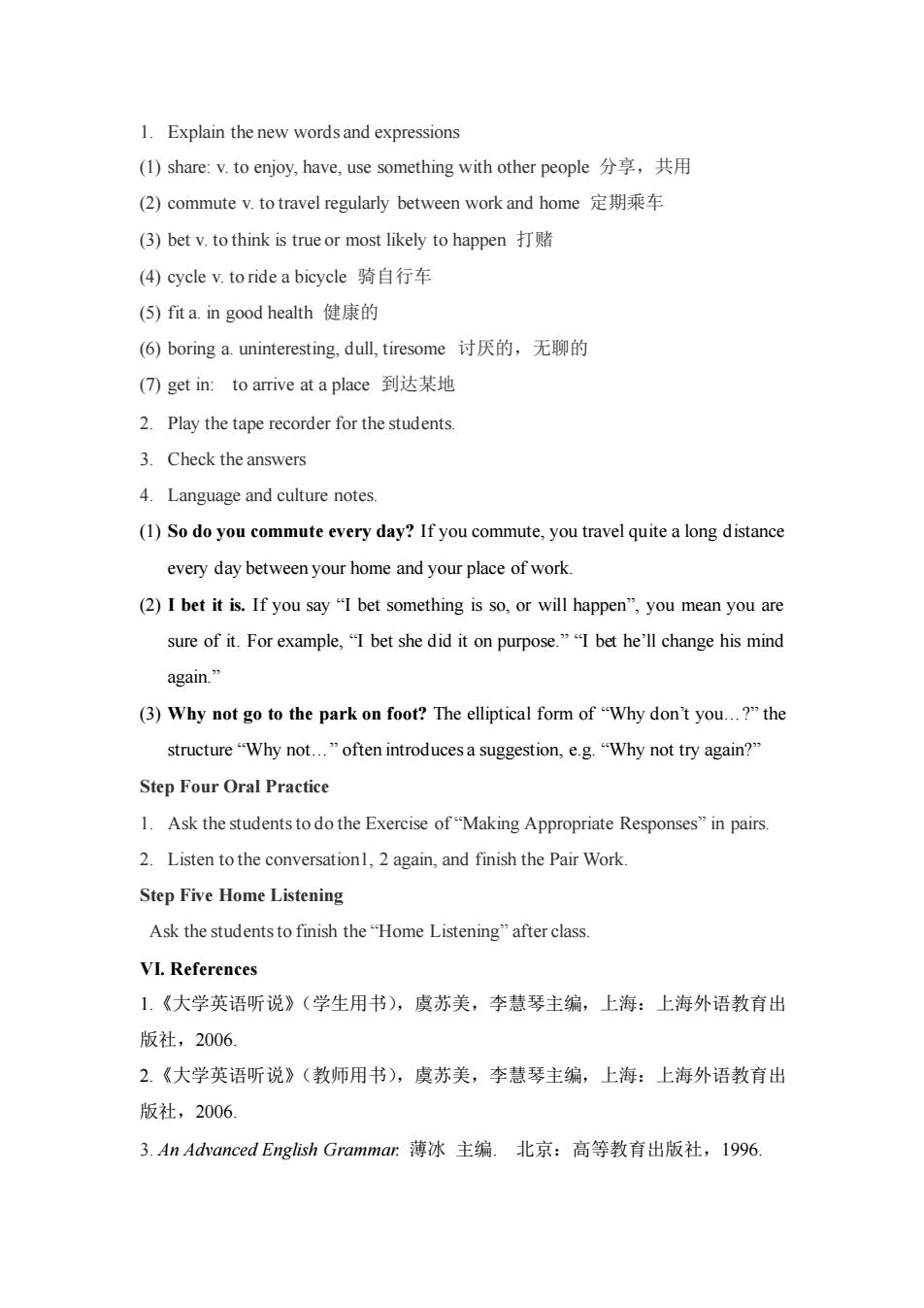正在加载图片...

1.Explain the new wordsand expressions (I)share:V.to enjoy,.have,use something with other people分享,共用 (2)commute v.to travel regularly between work and home定期乘车 (3)bet v.to think is true or most likely to happen (4)cycle v..toridea bicycle骑自行车 (⑤)fita.in good health健康的 (⑥boring a.uninteresting,dul,tiresome讨厌的,无聊的 (T)get in:to arrive at a place到达某地 2.Play the tape recorder for the students. 3.Check the answers 4.Language and culture notes. (1)So do you commute every day?If you commute,you travel quite a long distance every day between your home and your place of work. (2)I bet it is.If you say"I bet something is so,or will happen",you mean you are sure of it.For example,"I bet she did it on purpose."Ibet he'll change his mind again..” (3)Why not go to the park on foot?The elliptical form of"Why don't you...?"the structure"Why not."often introducesa suggestion,e.g."Why not try again? Step Four Oral Practice 1.Ask the studentsto do the Exercise of"Making Appropriate Responses"in pairs 2.Listen tothe conversation1,2 again,and finish the Pair Work Step Five Home Listening Ask the studentsto finish the"Home Listening"after class. VI.References 1.《大学英语听说》(学生用书),虞苏美,李慧琴主编,上海:上海外语教育出 版社,2006. 2.《大学英语听说》(教师用书),虞苏美,李慧琴主编,上海:上海外语教有出 版社,2006. 3.An Advanced English Grammar:薄冰主编.北京:高等教育出版社,19961. Explain the new words and expressions (1) share: v. to enjoy, have, use something with other people 分享,共用 (2) commute v. to travel regularly between work and home 定期乘车 (3) bet v. to think is true or most likely to happen 打赌 (4) cycle v. to ride a bicycle 骑自行车 (5) fit a. in good health 健康的 (6) boring a. uninteresting, dull, tiresome 讨厌的,无聊的 (7) get in: to arrive at a place 到达某地 2. Play the tape recorder for the students. 3. Check the answers 4. Language and culture notes. (1) So do you commute every day? If you commute, you travel quite a long distance every day between your home and your place of work. (2) I bet it is. If you say “I bet something is so, or will happen”, you mean you are sure of it. For example, “I bet she did it on purpose.” “I bet he’ll change his mind again.” (3) Why not go to the park on foot? The elliptical form of “Why don’t you…?” the structure “Why not…” often introduces a suggestion, e.g. “Why not try again?” Step Four Oral Practice 1. Ask the students to do the Exercise of “Making Appropriate Responses” in pairs. 2. Listen to the conversation1, 2 again, and finish the Pair Work. Step Five Home Listening Ask the students to finish the “Home Listening” after class. VI. References 1.《大学英语听说》(学生用书),虞苏美,李慧琴主编,上海:上海外语教育出 版社,2006. 2.《大学英语听说》(教师用书),虞苏美,李慧琴主编,上海:上海外语教育出 版社,2006. 3. An Advanced English Grammar. 薄冰 主编. 北京:高等教育出版社,1996